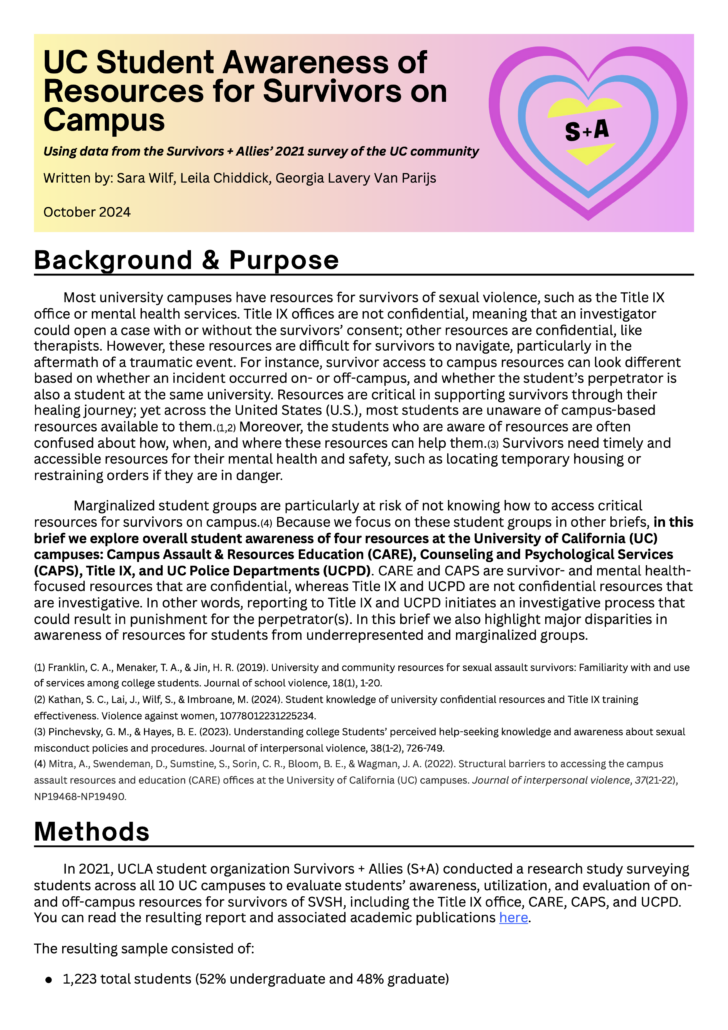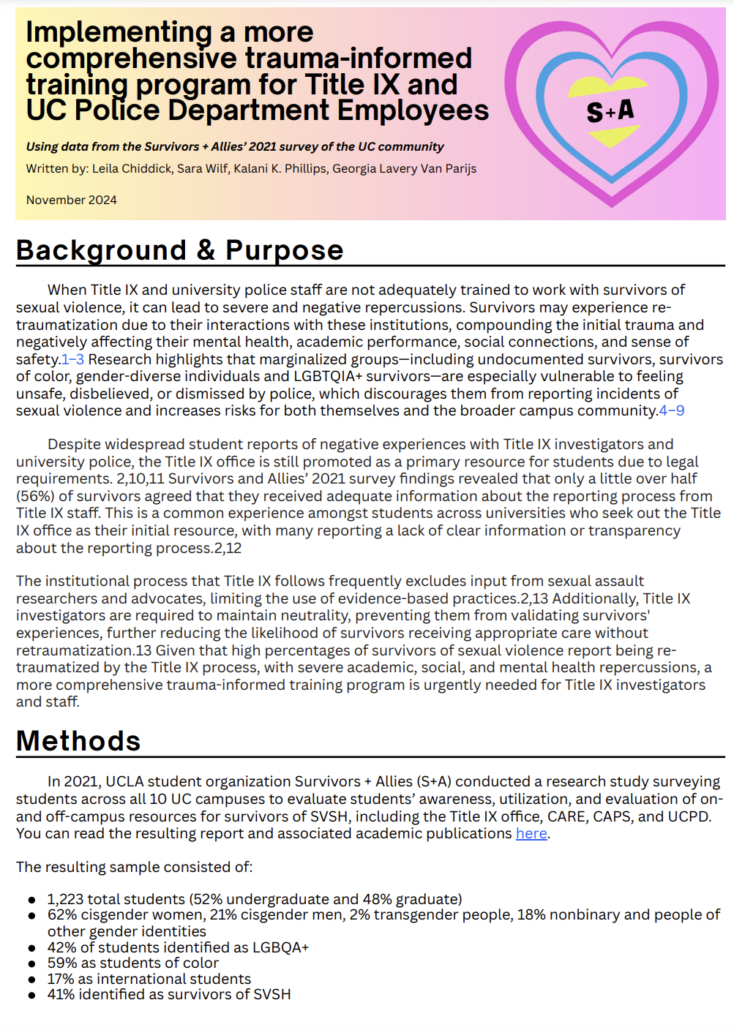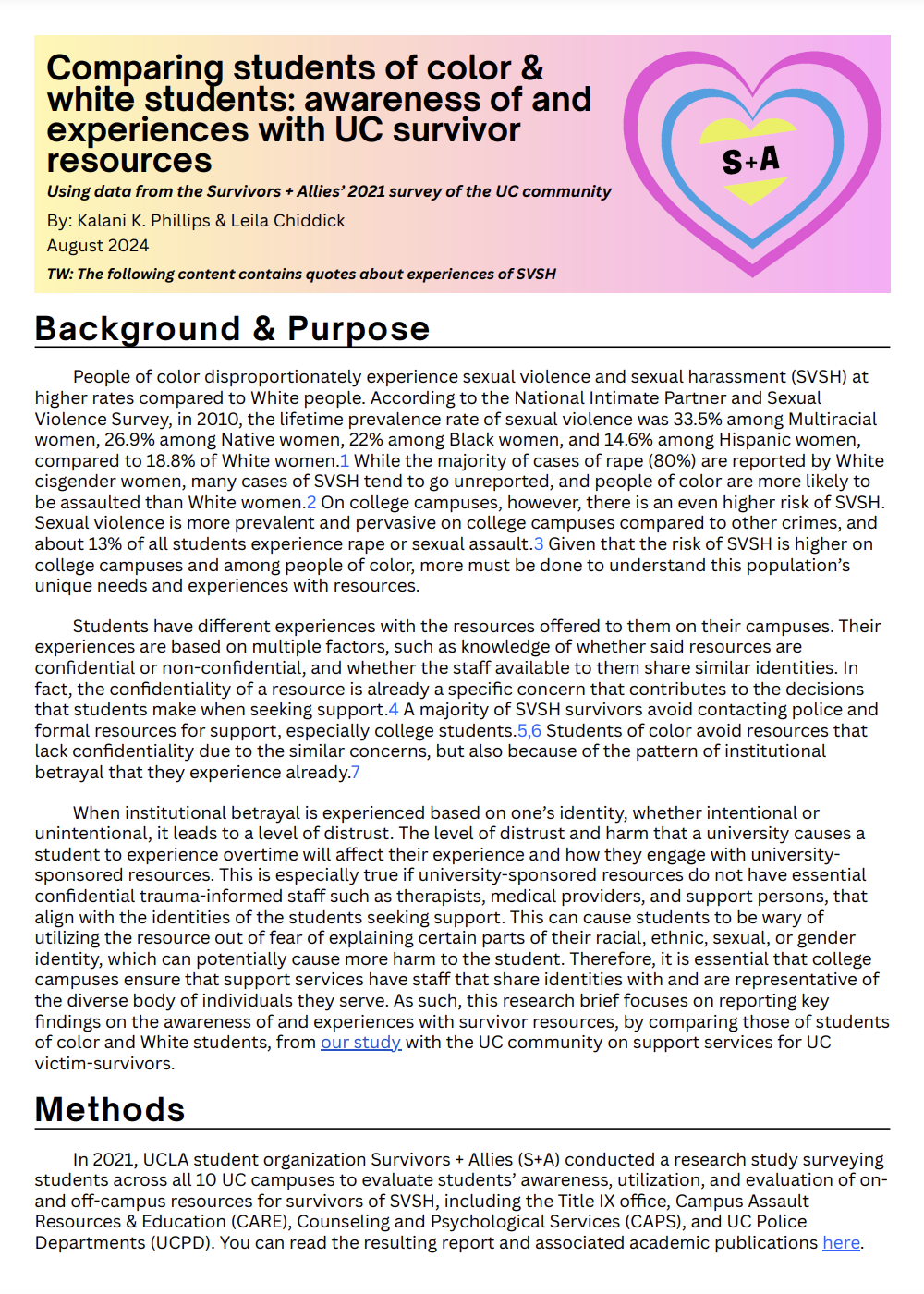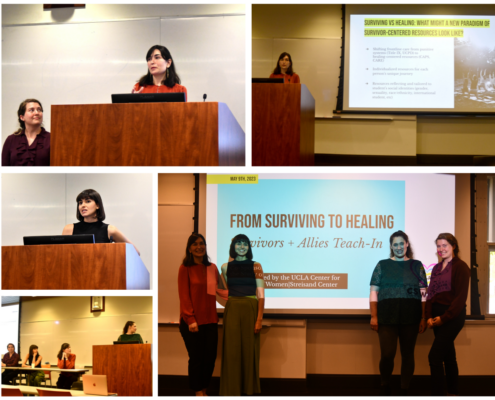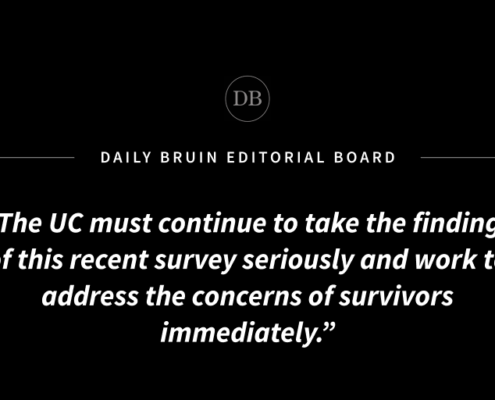Research Briefs
Survivors + Allies is using our research study of survivors across all 10 UC campuses to produce short research briefs on important topics we identified in our data. Briefs might highlight unique needs of certain student groups, such as International students, or the importance of certain practices, such as trauma-informed training. These briefs were produced in collaboration with Survivors + Allies members.
Current Briefs
Graduate Student Experiences & Perceptions of the Title IX Office at the UC
Graduate students uphold a variety of responsibilities across university campuses, including mentoring, teaching, and research. However, these unique responsibilities within the educational structure of graduate programs raise concerns surrounding imbalanced power dynamics with faculty and advisors1. As students like graduate student researchers tend to work directly with the faculty members that fund their cost of tuition, speaking out about sexual violence and sexual harassment (SVSH) could jeopardize their career prospects and potentially sever relationships with colleagues and others in their field. Being a graduate student also entails participating in a multitude of spaces including office hours, research conferences, and social events. Non-formal spaces like these tend to have unclear boundaries where there is a blurry distinction between professional and personal life, increasing the risk of SVSH2. These factors may influence decisions to report personal experiences of SVSH to university systems such as Title IX1,3. Furthermore, a lack of accountability or removal of perpetrators after making an official report may be difficult for survivors to trust support services in the future, given the mental burdens of seeing minimal change after a traumatic event.
Resources like the Title IX office are non-confidential resources where survivors must go through an extensive legal process after making an official report. This office exists under Title IX federal law and requires Responsible Employees to report sexual harassment, sexual violence, and discrimination internally to the university’s Title IX office. Per UC Policy on SVSH, any UC employee whose role is not designated as confidential are considered Responsible Employees4. This includes faculty, teaching assistants (TAs), research assistants, resident assistants, and managers/supervisors. As a majority of graduate students are Responsible Employees, disclosing incidents of SVSH may be challenging as many colleagues, faculty, and mentors also hold the same role. This creates a barrier as graduate student survivors may feel uncomfortable if the people around them are obligated to report their personal experience to Title IX. Especially considering graduate students who may have experienced an incident of SVSH from a faculty member, power dynamics may be amplified, making students less inclined to seek support.
This unique graduate student experience may not be the same for undergraduate students as they may not work under a faculty member as part of their requirements to complete a degree. While confidential resources such as the Campus Advocacy, Resources, and Education (CARE) office offer trauma-informed and survivor-centered support, graduate students are also significantly less aware of SVSH prevention and education resources on campus1,5. In general, college campuses have a larger undergraduate population, thus student outreach events and research efforts tend to be tailored towards the undergraduate population6,7. However, this leaves graduate students with fewer resources and fewer community members to turn to for support. Thus, it is imperative to address these challenges and pressure universities to prioritize the mental wellbeing of graduate student survivors. With their unique responsibilities, understanding graduate student experiences and imbalanced power dynamics is essential to provide adequate trauma-informed support.
Comparing confidential and non-confidential resources for UC survivors of sexual violence & sexual harassment (SVSH)
Sexual violence and sexual harassment (SVSH) are pervasive on college campuses across the United States (US). While some resources are available to support survivors of SVSH at these institutions, our Survivors + Allies (S+A) study showed many students had low knowledge and awareness of these resources and what they offer. Even in instances where students were aware of a resource, our findings showed that many students were confused about whether the resource was confidential or non-confidential. Yet students that identified as survivors and utilized resources had much better experiences and perceptions of confidential resources compared to non-confidential resources.
Resources that are specifically designated as “confidential” are critical support services for survivors of SVSH. In a previous study by Loney-Howes et al., researchers showed how confidentiality can encourage survivors to utilize support services. Confidential resources allow for a safe space in which survivors can share their experience and receive support—free of judgment or pressure to report their experiences to authorities. Confidential resources have designated “confidential advocates”, which are employees that are mandated reporters but not responsible employees. Mandated reporters, for example, are required by California law to report suspected child abuse or neglect to external authorities (i.e., Child Protective Services or law enforcement), while responsible employees are designated under Title IX federal law and required to report sexual harassment, sexual violence, and discrimination internally to the university’s Title IX office. Responsible employees make up a significant portion of employees in the UC system, and include student workers as well as both administrators and teaching staff.
Resources like the Campus Assault Resources & Education (CARE) program, Counseling and Psychological Services (CAPS) or other school counseling centers, and the Office of the Ombuds (which is not available at every UC campus) are the only on-campus confidential UC resources. When seeking support from a confidential resource, a student can receive help whether or not they choose to make an official report with an officer, engage with the justice system by taking legal action, or file a complaint to the University. No further investigation is required by the confidential advocates or counselors that are employed by these organizations as they are not designated responsible employees. With this in mind, these confidential support resources tend to utilize a survivor-centered and trauma-informed approach to address instances of SVSH.
Conversely, both the UC Police Department (UCPD) and Title IX are non-confidential resources. Compared to confidential resources, when receiving support from a non-confidential resource, employees who are informed by a survivor of their experience are obligated to report the incident (either to law enforcement or the university’s Title IX office), thereby triggering an investigation that is not confidential. When interacting with UC resources like Title IX or UCPD, survivors must usually go through an extensive process to file an official report or open a case in order to receive support or utilize the resource.
It is clear that UCPD and other campus police departments play a role in responding to reports of SVSH when survivors choose to report an incident to law enforcement or Title IX, but involving police does not always serve survivors. For example, involving police can cause “revictimization”. Further, research indicates that student survivors are significantly less likely to report incidents of SVSH to campus police compared to Title IX or peers, due to concerns with privacy and confidentiality, as well as fears of victim-blaming during the reporting or investigative process. Despite these findings, both Title IX and UCPD are positioned as frontline resources for survivors of SVSH on college campuses.
College campuses should move toward positioning survivor-centered, trauma-informed, confidential resources as frontline resources for survivors of SVSH. Research suggests that concerns with confidentiality create barriers to seeking help after an incident, underscoring the importance of establishing trust, understanding, privacy, and safety. However, there is variation in student knowledge on confidential resources in the UC system. This can create problems for students seeking support during a difficult time or after a traumatic event. If a student is unaware that a resource is non-confidential and seeks assistance, they may be at risk of experiencing more harm. For instance, if a student did not want to formally report an incident and went on to disclose an incident thinking it was confidential, they may feel forced to continue in the extensive reporting process, which some survivors in our study have stated to be “re-traumatizing” and unhelpful to their healing process. Given the high number of responsible employees at UC campuses, it is imperative that survivors know where to receive confidential support. Furthermore, it is critical that confidential resources be positioned as frontline resources for survivors on college campuses, as these resources are preferred by survivors and tend to utilize a survivor-centered and trauma-informed approach.
UC Student Awareness of Resources for Survivors on Campus
Most university campuses have resources for survivors of sexual violence, such as the Title IX office or mental health services. Title IX offices are not confidential, meaning that an investigator could open a case with or without the survivors’ consent; other resources are confidential, like therapists. However, these resources are difficult for survivors to navigate, particularly in the aftermath of a traumatic event. For instance, survivor access to campus resources can look different based on whether an incident occurred on- or off-campus, and whether the student’s perpetrator is also a student at the same university. Resources are critical in supporting survivors through their healing journey; yet across the United States (U.S.), most students are unaware of campus-based resources available to them. Moreover, the students who are aware of resources are often confused about how, when, and where these resources can help them. Survivors need timely and accessible resources for their mental health and safety, such as locating temporary housing or restraining orders if they are in danger.
Marginalized student groups are particularly at risk of not knowing how to access critical resources for survivors on campus. Because we focus on these student groups in other briefs, in this brief we explore overall student awareness of four resources at the University of California (UC) campuses: Campus Assault & Resources Education (CARE), Counseling and Psychological Services (CAPS), Title IX, and UC Police Departments (UCPD). CARE and CAPS are survivor- and mental health-focused resources that are confidential, whereas Title IX and UCPD are not confidential resources that are investigative. In other words, reporting to Title IX and UCPD initiates an investigative process that could result in punishment for the perpetrator(s). In this brief we also highlight major disparities in awareness of resources for students from underrepresented and marginalized groups.
Implementing a more comprehensive trauma-informed training program for Title IX and UC Police Department Employees
When Title IX and university police staff are not adequately trained to work with survivors of sexual violence, it can lead to severe and negative repercussions. Survivors may experience re-traumatization due to their interactions with these institutions, compounding the initial trauma and negatively affecting their mental health, academic performance, social connections, and sense of safety. Research highlights that marginalized groups—including undocumented survivors, survivors of color, gender-diverse individuals and LGBTQIA+ survivors—are especially vulnerable to feeling unsafe, disbelieved, or dismissed by police, which discourages them from reporting incidents of sexual violence and increases risks for both themselves and the broader campus community.
Despite widespread student reports of negative experiences with Title IX investigators and university police, the Title IX office is still promoted as a primary resource for students due to legal requirements. Survivors and Allies’ 2021 survey findings revealed that only a little over half (56%) of survivors agreed that they received adequate information about the reporting process from Title IX staff. This is a common experience amongst students across universities who seek out the Title IX office as their initial resource, with many reporting a lack of clear information or transparency about the reporting process.
The institutional process that Title IX follows frequently excludes input from sexual assault researchers and advocates, limiting the use of evidence-based practices. Additionally, Title IX investigators are required to maintain neutrality, preventing them from validating survivors’ experiences, further reducing the likelihood of survivors receiving appropriate care without retraumatization. Given that high percentages of survivors of sexual violence report being re-traumatized by the Title IX process, with severe academic, social, and mental health repercussions, a more comprehensive trauma-informed training program is urgently needed for Title IX investigators and staff.
The Importance of Trauma-Informed Training for Responsible Employees
“Responsible employees” are professionals employed by a university who are required to report any instances of sexual violence, harassment, assault, and discrimination that occur on campus.1 This requirement is enforced and regulated by Title IX federal law, which was expanded to protect students from sexual violence, harassment, and discrimination.1,2 Similarly, “mandated reporters” are required to report misconduct to protect individuals from harming themselves or others. Mandated reporters are required by the California Child Abuse and Neglect Reporting Act (CANRA) to report suspected child, elder, or dependent abuse or neglect to external authorities (i.e., Child Protective Services or law enforcement).
In the University of California (UC) system, both mandated reporters and responsible employees have distinct roles in reporting misconduct. While both have reporting obligations, they serve different purposes. Responsible employees are designated under Title IX and required to report sexual violence and sexual harassment (SVSH) to the university’s Title IX office. Conversely, mandated reporters report to law enforcement if they suspect someone is being harmed. Mandated reporters expand beyond the UC system, including health staff, mental health clinicians, and confidential employees on- and off-campus.
Most UC employees are responsible employees. As responsible employees, graduate students who work as teaching assistants, research coordinators, and in supervisor roles should be aware of their status as responsible employees, as well as how to support survivors and provide them with an array of resources available on campus. In addition, faculty and staff should be held to the same standard. It is essential that graduate students, research coordinators, faculty, and staff are trained to be trauma-informed, as they support and work closely with various student populations.
Furthermore, graduate students, regardless of the specific work they do for the university, deserve to work in an environment that is safe and supportive. A safe and supportive environment can be fostered by providing trauma-informed training on what it means to be a responsible employee, where someone can go for confidential support, and how to redirect a survivor to resources when they can’t be a support person.3 Graduate students are still students, and although their role as a responsible employee is required, they still have a responsibility to support themselves. Hence, learning how to support survivors in different ways, including redirecting them to proper resources, is a part of trauma-informed training.4 Responsible employees can cause more harm and re-traumatization for survivors without the proper language and knowledge of how to support a survivor.5,6 Therefore, graduate students, faculty, and staff must receive more comprehensive trauma-informed training as representatives of the university.
Comparing students of color & white students: awareness of and experiences with UC survivor resources
People of color disproportionately experience sexual violence and sexual harassment (SVSH) at higher rates compared to White people. According to the National Intimate Partner and Sexual Violence Survey, in 2010, the lifetime prevalence rate of sexual violence was 33.5% among Multiracial women, 26.9% among Native women, 22% among Black women, and 14.6% among Hispanic women, compared to 18.8% of White women. While the majority of cases of rape (80%) are reported by White cisgender women, many cases of SVSH tend to go unreported, and people of color are more likely to be assaulted than White women. On college campuses, however, there is an even higher risk of SVSH. Sexual violence is more prevalent and pervasive on college campuses compared to other crimes, and about 13% of all students experience rape or sexual assault.3 Given that the risk of SVSH is higher on college campuses and among people of color, more must be done to understand this population’s unique needs and experiences with resources.
Students have different experiences with the resources offered to them on their campuses. Their experiences are based on multiple factors, such as knowledge of whether said resources are confidential or non-confidential, and whether the staff available to them share similar identities. In fact, the confidentiality of a resource is already a specific concern that contributes to the decisions that students make when seeking support. A majority of SVSH survivors avoid contacting police and formal resources for support, especially college students. Students of color avoid resources that lack confidentiality due to the similar concerns, but also because of the pattern of institutional betrayal that they experience already.



